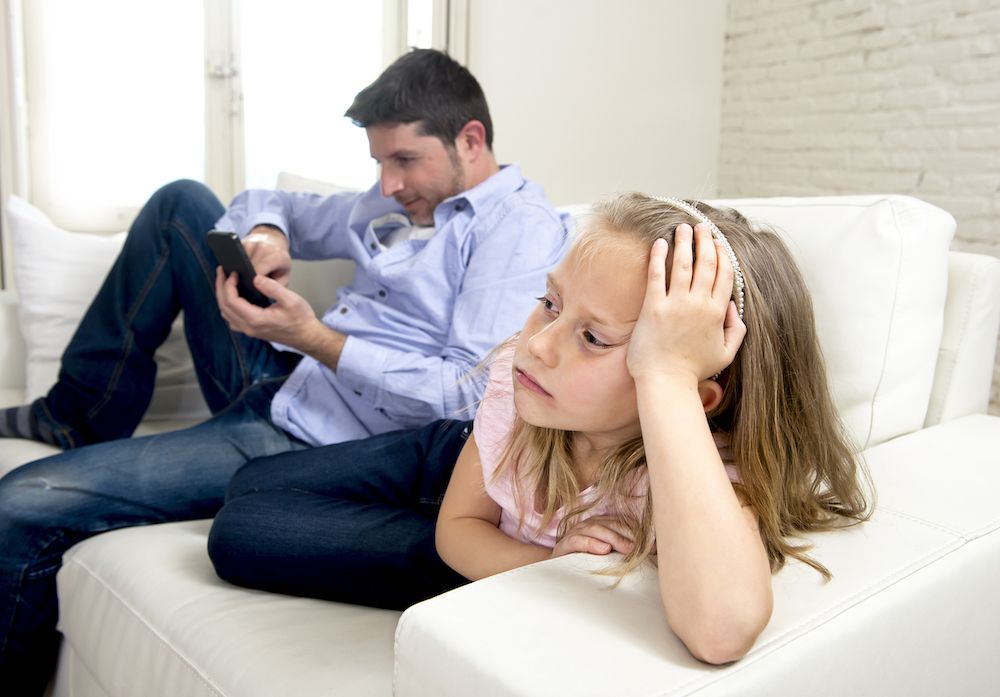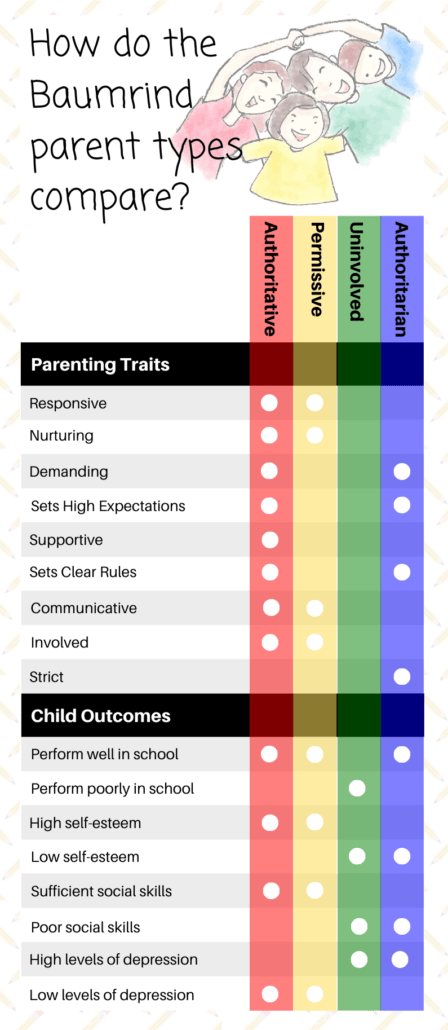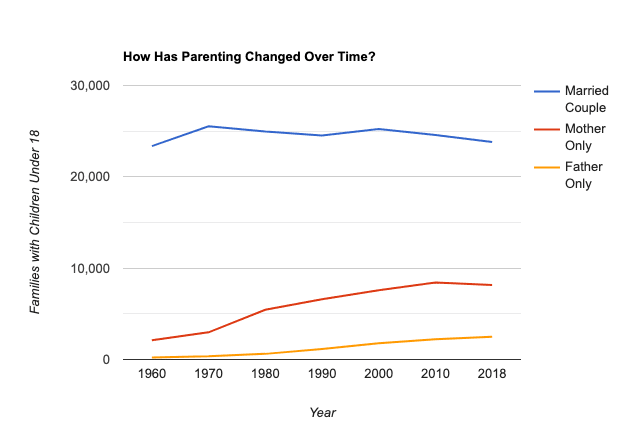Parenting! It’s an active role that millions of first-time parents take on each year.
However, beyond the nursing books, school district choices, and organic baby food is a more divisive decision that should be resolved before children take their first breaths: parenting style.
Parenting is a curious subject that is dependent on personal factors that vary among parents. Nonetheless, it is widely recognized that parenting is the process of promoting and supporting the physical, emotional, social, and intellectual health and development of a child.
There is significant research that proves that the environment that a child is raised in impacts behaviors and values. Effective parenting can prevent negative behaviors and promote healthful growth. Likewise, less-than-desirable parenting practices can cause poor habits, behaviors, and values.
This begs the question to be answered, “What parenting style should you adopt?”
In this guide, we will discuss the different types of parenting, their effects on children, and what the experts say about parenting. Keep reading to learn more!
Table of Contents
- Authoritarian parenting
- Authoritative parenting
- Permissive parenting
- Neglectful parenting
- How do the Baumrind parent types compare?
- How to choose a parenting type
- Parenting quotes and tips from experts
- How has parenting changed over time?
- Childcare as an extension of parenting
Types of Parenting for Curious Parents
There is a great deal of research for new and curious parents that want the best for their children. For example, Baumrind Parenting Types outline four parenting types. In this guide, we will cover the Baumrind Parenting types and how they affect children.
What are Baumrind Parenting Types?
Put simply, the Baumrind parenting types are four parenting styles founded by psychologist Diana Baumrind to characterize parenting. Through her research, Dr. Baumrind observed and described three types of parenting that draw relationships between basic parenting styles and children’s behavior. This theory is known as the Pillar theory or Baumrind parenting types.
The following are Baumrind’s parenting types:
The following guide examines each of Baumrind’s parenting types and their advantages and disadvantages.
Authoritarian Parenting

They are obedience and status-oriented and expect orders to be obeyed without explanation. -Baumrind
Authoritarian parenting—or helicopter parenting—is a strict style of parenting, according to Baumrind. Parents that use this parenting style are characterized as highly demanding and directing, but unresponsive.
To elaborate, authoritarian parents implement clear rules, set high standards, and maintain a well-ordered environment. In addition, communication is often one-sided: parent to child. All in all, authoritarian parents are typically less nurturing.
Furthermore, the authoritarian parenting style is separated into two categories: nonauthoritarian-directive and authoritarian-directive. Parents categorized as nonauthoritarian-directive are direct, but not intrusive or autocratic with their use of power. Authoritarian-directive parents wield their power intrusively.
How does this affect children?
As said before, Dr. Baumrind studied different parenting types in relation to how the parenting style affected children. In this case, Baumrind found that children with authoritarian parents typically perform moderately well in school. Likewise, they tend not to exhibit problem behaviors. Correspondingly, adolescents from authoritarian families display poor social skills, low self-esteem, and higher levels of depression.
Authoritarian Parenting: Advantages and Disadvantages
Pros
- Set high standards
- Creates a constructive and safe environment
- Establishes strong values
Cons
- Children exhibit poor social skills.
- In general, kids have low self-esteem and higher levels of depression
- The authoritarian parenting style is considered less nurturing
How are child outcomes determined? Amazingly, through Dr. Baumrind’s study, she identified probable child outcomes based on parenting type. Through a multitude of parent interviews, child reports, and parent observation Baumrind found that parent responsiveness is an accurate indicator of social competence and psychological functioning. Likewise, how demanding parents are is closely associated with child behavioral control. That being said, there is an exception to every rule, and child outcomes can deviate because of outstanding variables.
Authoritative Parenting

They want their children to be assertive as well as socially responsible, and self-regulated as well as cooperative. -Baumrind
Authoritarian parents strike an uncanny balance of demandingness and responsiveness! Authoritative parents communicate clear standards, rules, and expectations to their children. They are firm; however, they are not intrusive or restrictive.
Authoritative parenting is often confused with the authoritarian parenting type because of similar characteristics. However, each parenting type produces different child outcomes. Why? Baumrind credits the severity of psychological control that each parenting type holds over the child.
To elaborate, both authoritarian and authoritative parents set high demands and standards. However, authoritarian parents take this control a step further. Authoritarian parents expect blind obedience without question. In comparison, authoritative parents are more open to a back-and-forth dialogue to explain standards and demands.
Ultimately, this slight variation in psychological control produces significantly different results.
How does this affect children?
Of all the parenting types, the authoritative parenting type reaps the most desired child outcomes. Authoritative parents most consistently produce children that exhibit social competence. In addition, they tend to perform to satisfaction in school. Even more, children raised by authoritative parents experience low levels of depression and problem behavior.
Authoritative Parenting: Advantages and Disadvantages
Pros
- Set high standards
- Creates a constructive and safe environment
- Establishes strong values
- Children exhibit competent social skills
- Kids have high self-esteem and low levels of depression
Cons
- No immediate disadvantages based on Baumrind’s study.
Permissive Parenting

They are nontraditional and lenient, do not require mature behavior, allow considerable self-regulation, and avoid confrontation. -Baumrind
Where authoritarian parents are strict, permissive parents—or indulgent parents—are the opposite of strict. Indulgent parents are more responsive than they are demanding.
This type of parent is considered lenient, warm, and responsive. Expectations and rules set by parents are usually minimal. Additionally, indulgent parents encourage their children to solve their problems rather than give strict advice to abide by.
Indulgent parents are divided into two groups: democratic parents and nondirective parents. Democratic parents are lenient; nevertheless, are more engaged and committed to their child.
How does this affect children?
Children raised by indulgent parents are more likely to experience higher levels of self-esteem. Additionally, they tend to have better social skills and lower levels of depression. However, as a tradeoff, children from permissive homes are more likely to be involved in problem behavior and perform less well in school.
Permissive Parenting: Advantages and Disadvantages
Pros
- Permissive homes are considered more nurturing
- Children experience higher levels of self-esteem and low levels of depression
- Permissive children are more socially competent
Cons
- Rules and expectations are not clearly defined
- Children are more likely to exhibit problem-behavior and perform poorly in school
Neglectful Parenting

Uninvolved parents, or neglectful parents, were not originally included in Dr. Baumrind’s parenting types. In fact, this fourth parenting type was added in 1983—more than two decades after Baumrind’s original study was published—by Maccoby and Martin. The two psychologists expanded the framework to include uninvolved parents.
Neglectful parenting is low in both demandingness and responsiveness. They are typically categorized as cold, unresponsive, and indifferent.
How does this affect children?
The impact of neglectful parenting is the most devastating of all the Baumrind parenting types. Children raised in neglectful homes experience lower levels of self-esteem and higher levels of depression. Likewise, they are more likely to perform poorly in school and exhibit behavior problems.
Neglectful Parenting: Advantages and Disadvantages
Pros
- No immediate advantages based on Baumrind’s study.
Cons
- The child has low self- esteem issues and higher levels of depression.
- Perform poorly in school
- Exhibit frequent behavior problems
- Neglectful homes are considered volatile and in some cases dangerous
How do the Baumrind parent types compare?

How to Choose a Parenting Type
There are a plethora of parenting types that one can research on a whim. Dr. Baumrind’s pillar theory, John B. Watson’s detached parenting ideals, B.F. Skinner’s operant conditioning method—and the list goes on!
For new or questioning parents, this begs the questions, “Is there a correct parenting type? How do I choose a parenting type?”
Sadly, there is not a definitive answer to those questions. The answers are varied based on the parent’s values, culture, and environment.
Nonetheless, according to the American Psychological Association (APA), a high-quality parent-child relationship is critical for healthy development. As a result, the APA recognizes three goals that parenting practices around the world should achieve for the best child outcome:
- The practice should ensure the child’s health and safety.
- Parents should prepare children for life as a productive adult.
- Parenting practice should transmit cultural values.
Surprisingly, by Dr. Baumrind’s standards, the authoritative parenting type fulfills each APA parenting goal most accurately. To recap, authoritative parents, are most likely to create a constructive home environment that nurtures a self-sufficient child.
All in all, Dr. Baumrind’s authoritative parenting type fulfills all of the APA’s parenting goals. In conclusion, it is advantageous for parents to adapt the authoritative parenting type to their values and practices.
10+ Parenting Quotes and Tips from Experts
Build Strong Relationships
“Learning to share appropriate power with a child is a skill that takes some time to understand and develop.” -Alyson Schafer, Family Counselor and Parenting Expert, #AskAlyson: Building Stronger Relationships
Raising Well-Behaved Children
“It’s important to remember that last-minute rules and consequences almost always result in fights and meltdowns. The key to raising well-behaved children with very little stress, yelling or punishment, is to use consistent, planned and clear parenting techniques.” -Susan Bartell, Psychologist, Proactive Parents Raise Better-Behaved Kids
Understanding Emotions and Feelings
“As soon as children can talk, help them learn to label and understand their emotions. The more you can meet their inevitable moments of frustration with acceptance and an eye toward solutions, the sooner they will learn to do the same. The keyword here is ‘support.'” -Tom Limbert, Parenting Coach, How to Prepare Your Child for Preschool
Encouragement vs. Praise
“Encouragement demonstrates faith and belief in a child. It asserts your unconditional love and regard for them. Praise can only be used for those kids who are doing well, while encouragement can be used for all children and especially for those with struggles.” -Alyson Schafer, Family Counselor and Parenting Expert, Alyson Schafer Advice: Stop Over-Praising Your Kids
Dealing with Parenting Woes
“It can be uplifting to look at your present parenting situation in a silly way. Put simply, it reminds us as parents that our current experiences will not last forever. The kids will grow up and move on to other challenges. They will make their marks on the world, and on us. And we’ll be better for it.” -Heidi Smith Luedtke, Personality Psychologist, Stages of Motherhood: Take a Look on the Light Side
Teaching Responsibility
“To raise a responsible and respectful child who matures into an effective and capable adult, you need to help your child learn how to handle increased responsibilities and freedom.” -Nancy Buck, Developmental Psychologist, Tips to Avoid Helicopter Parenting
‘I’m Bored?’
“Kids need to learn how to manage their time and cope with uncomfortable feelings, such as boredom and impatience, and they need to learn how to solve their own problems. Downtime gives them the emotional and cognitive space to recognize that, in fact, there are problems that require solutions, and then gives the brain an opportunity to think deeply about these problems and possible solutions.” -Susan Bartell, Psychologist, Is Your Child Getting Enough Real Downtime?
Communicating with Children
“The important part of listening to our children is to help them express their feelings and to make them feel understood.” -Alyson Schafer, Family Counselor and Parenting Expert, 6 Communication Tips For Parents Who are Tired of Fighting with Their Kids
The Golden Rule
“If you want your child to treat her peers and teachers with respect there are two things you can do: 1. Treat your child with respect. Use respectful tones and language with her and in her presence. 2. Encourage your child to do the same to you and to others.” -Tom Limbert, Parenting Coach, How to Prepare Your Child for Preschool
Encouraging Self-Discovery
“Encourage their independence by refraining from the natural inclination to fix everything. Rather, ask open-ended, thought-provoking questions that scaffold your child to her own discoveries and conclusions!” -Tom Limbert, Parenting Coach, Seven Ways to Encourage Your Child
Child Independence
“Good parenting is not achieved by manipulating outcomes in a child’s life. Doing so teaches a child that hard, independent work isn’t necessary because someone else will do it for him.” -Susan Bartell, Psychologist, How Much Has Parents Be Involved?
Finding Power Within
“Helping your children meet their need for power within means giving them lots of opportunities to do something new and evaluate if they did it well enough to meet their own standard.” -Nancy Buck, Developmental Psychologist, Help Your Kids Tap Into the Power Within
How Has Parenting Changed Over Time?

Source: U.S Census Bureau
The central parenting principles outlined by the American Psychological Association has not changed significantly over time. But, according to the U.S. Census Bureau, the family unit has vastly changed.
The common family unit is known as the nuclear family. A nuclear family is a family group consisting of two parents and their children. Regardless, this ideal family picture is fast-changing, according to Pew Research. In a popular study, The Decline of Marriage and Rise of New Families, researchers state that changing lifestyles and economics over the past century have altered American’s ideas of family.
By far, the greatest change is the burgeon in single-parent households. According to the U.S Census Bureau, single mothers made up 4.6% of surveyed families in 1960; for reference, Baumrind published her groundbreaking study in 1966. Comparatively, in 2018, the number of single mothers increased to 9.8%. Likewise, single fathers made up 0.5% of surveyed families in 1960 and increased to 2.9% in 2018.
How does this relate to parenting?
In the traditional family, ideally, two parents share the responsibility of raising a child. Two parents provide differing parenting perspectives and styles to create a well-rounded home environment. Single parents can also provide this secure family environment but may struggle without the support of a partner and/or support system.
Regardless, ultimately, there are a plethora of outstanding factors that affect parenting styles—for example, family culture, economic status, employment, and education.
Likewise, the advancement of technology has greatly impacted the way parents interact with their children!
According to the Journal of Developmental & Behavioral Pediatrics, guardians use of mobile devices—cell phones and tablets—around children creates internal tension and conflict. In addition, it increases negative interactions with kids affecting both parents and children.
With this in mind, it is important to recognize the several outstanding factors that may inadvertently affect your parenting style.
All in all, parenting has changed greatly over time; nonetheless, parenting goals have stayed the same. It is up to the parent to adapt their parenting style to change with the times.
Childcare as an Extension of Parenting

Like parenting types, childcare is a momentous decision that parents must make with care! The care that preschools provide has a profound effect on children that impacts their behavior.
School is typically the largest and most important institution with which young people are involved, and it is a primary context for their development – Institute of Medicine and National Research Council, The Science of Adolescent Risk-Taking
By and large, schools have varying structural characteristics such as classroom size, teacher-student ratio, and teacher mobility. Desirable characteristics can encourage students to exceed the standard. Whereas, inadmissible characteristics may embolden problem behavior.
So, what is the solution? Idealistically, a childcare center like Cadence Education!
Cadence Education is a leading early childhood educator in the United States, operating more than 200 private preschools and elementary schools. For more than 20 years, Cadence Education has developed and refined unparalleled expertise in preparing students to thrive in adolescence.
Above all else, Cadence Education values exceptional education and meaningful communication. They fulfill these values with a nurturing environment and fun-filled days!
Students flourish in Cadence’s home-like environments that are outfitted with stimulating lights, colors, smells, and spaces to encourage physical and emotional excellence.
Each day is filled with laughter, silliness, and fun that inspires a love for learning and nurtures positive behaviors.
The results speak for themselves! In 2017, a study using the Scholastic Kindergarten readiness test found that 90% of Cadence Education students were ready for Kindergarten. Even more, nearly two out every three students were rated advanced.
Students aren’t the only ones that are satisfied with their Cadence Education experience. In a recent parent survey, parents regarded their student’s teachers highly for their competence and genuine concern for each student.
Join this community of satisfied parents and happy children!
Cadence Education has a multitude of private preschools and elementary schools from coast to coast. It only takes one leap of goodwill to start a chain reaction of positive outcomes!
Contact Cadence Education to find the school nearest you and start the enrollment process.

